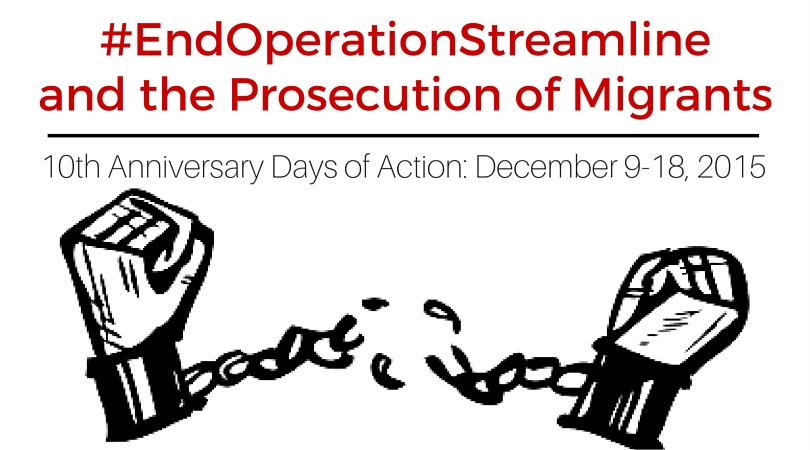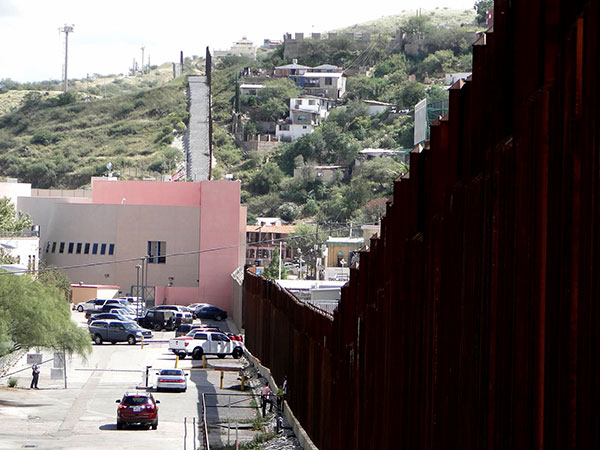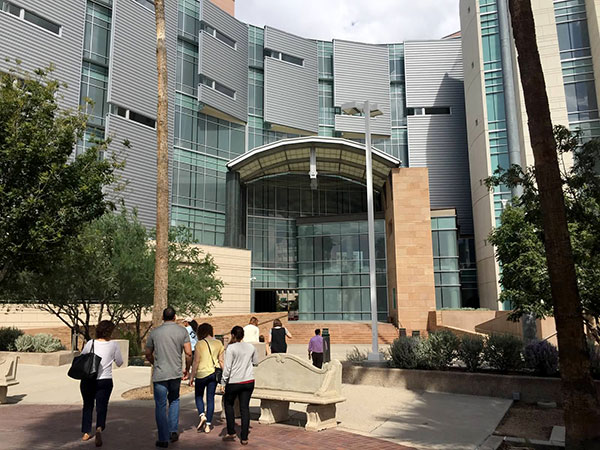Every weekday, in a courtroom in the Evo A. DeConcini U.S. Courthouse in Tucson, Arizona, about 70 people are tried and sentenced for crimes related to unauthorized entry or re-entry into the United States. The defendants in these proceedings have been apprehended, detained for several days, and hand-selected by the U.S. Border Patrol to face criminal charges through a program known as “Operation Streamline.” In the morning, each defendant is assigned a lawyer. In the afternoon, after a two-to-three hour proceeding, nearly each defendant will have pled guilty to a misdemeanor and will be sentenced to 30 to 180 days in prison. Within the course of just one day, only days after their arrival in the United States, these individuals will be sent to prison and will have a criminal record that will stay with them the rest of their lives.
|
Border wall in Nogales, Arizona |
I had the occasion to witness the proceedings of Operation Streamline on a recent visit to Tucson as part of a delegation from Loyola University Chicago. Upon entering the courtroom, a foul stench overwhelms the senses – a stench that results when dozens of individuals are held for days in detention without access to showers, after they have endured long and often harrowing journeys through the Arizona desert. At the center of the courtroom, the defendants sit in rows of nine, their shoe laces and belts removed, their hands chained across their waists, and their feet shackled at their ankles. A couple of Spanish language interpreters are on hand, and most defendants are wearing headphones through which they receive a translation of the proceedings. U.S. Marshals and a federal prosecutor stand watch. A scattering of attorneys – perhaps one or two federal public defenders, but more commonly Criminal Justice Act attorneys, who are hired routinely to represent the overwhelming number of defendants – are dispersed throughout the room, each designated the responsibility of counseling about four to six defendants.
At the front of the room sits a judge who is charged with carrying out the proceedings. As the en masse trial begins, the judge proceeds through a carefully crafted script, tailored to transmit information and elicit responses to meet some approximation of due process. The judge poses certain group questions to the defendants, asking those with statements to stand before the entire group to speak. Groups of five are then called up to stand at microphones before the judge and are in turn posed an additional list of questions in the lead up to a guilty plea.
Since Operation Streamline proceedings result in imprisonment and a criminal record, ensuring due process is indisputably crucial. It is well established that, just as with U.S. citizens and legal residents, undocumented immigrants are owed full protection under the due process clauses of the Fifth and Fourteenth Amendments to the U.S. Constitution. As part of ensuring due process, the Federal Rules of Criminal Procedure require that a judge make a finding that any guilty plea be entered into knowingly, voluntarily and intelligently. However, given how rushed Operation Streamline proceedings are, it is difficult to see how this can be achieved.
|
Tucson courthouse where Operation Streamline proceedings are held. |
Indeed, many factors call into question Operation Streamline’s ability to provide due process. First, defense attorneys in Tucson are typically afforded no longer than 30 minutes per client for individual consultations on the morning of the trials. In this short time, a defense attorney will need to cover dozens of topics, including explaining the charges, the prosecutor’s plea deal and the consequences of a guilty plea. Will the defense attorney have time to determine if the defendant has a derivative claim to U.S. citizenship? Will the defense attorney be able to screen for potential asylum claims? Will the defense attorney have sufficient time and resources to determine if any physical or mental health factors may have an impact on the outcome of the case? Thirty minutes is insufficient time to uncover all the potential avenues for legal recourse for a client, let alone to explain the consequences of a guilty plea.
Second, consultations between attorneys and defendants are held in the open – in the very same courtroom that will later hold the en masse trial. Within earshot of one defendant might be a relative, someone from the same hometown, the defendant’s own smuggler, or someone else who may be able to exact influence upon the defendant, either during a prison sentence or upon return back home. A defendant under such circumstances would understandably be reluctant to be fully open with his or her lawyer and may withhold information that could have a real impact on his or her case.
Third, given the speed and the circumstances of the procedures, it is unlikely that all defendants can fully process the nature of the proceedings and the myriad consequences of their pleas. In Operation Streamline, most of the defendants are unfamiliar with the U.S. legal system and many have low levels of formal education. Many are sleep deprived and dehydrated following long journeys through the desert, calling into question their ability to truly understand and engage in the proceedings.
 The effects of such rushed process were evident during our visit. Toward the beginning of the proceedings and during the judge’s group questions, the judge asked whether anyone was on medication that might affect or impair their decision-making abilities. One man stood up and, through an interpreter, stated he was taking phenytoin. There was a silence in the courtroom as the judge looked to the attorneys, who in turn looked to one other and the prosecutor to see if anyone knew what phenytoin is. Medical students who were observing the proceedings with me were aware that phenytoin is a common seizure medicine. As for the judge and attorneys in the courtroom, it was clear they were trying to make a conclusion – quickly – as to what this drug is and what effects it might have. No medical experts were called to testify, but after some side discussions, the judge concluded the defendant could continue as part of the proceedings. But phenytoin does carry potential side effects, including mental confusion and trouble speaking. How could anyone in that courtroom be sure it did not affect the defendant’s judgment or ability to understand and participate in the proceedings?
The effects of such rushed process were evident during our visit. Toward the beginning of the proceedings and during the judge’s group questions, the judge asked whether anyone was on medication that might affect or impair their decision-making abilities. One man stood up and, through an interpreter, stated he was taking phenytoin. There was a silence in the courtroom as the judge looked to the attorneys, who in turn looked to one other and the prosecutor to see if anyone knew what phenytoin is. Medical students who were observing the proceedings with me were aware that phenytoin is a common seizure medicine. As for the judge and attorneys in the courtroom, it was clear they were trying to make a conclusion – quickly – as to what this drug is and what effects it might have. No medical experts were called to testify, but after some side discussions, the judge concluded the defendant could continue as part of the proceedings. But phenytoin does carry potential side effects, including mental confusion and trouble speaking. How could anyone in that courtroom be sure it did not affect the defendant’s judgment or ability to understand and participate in the proceedings?
There are real consequences to these proceedings. In addition to having a criminal record and a prison sentence, defendants face the risk of heightened sentencing should they attempt to cross the border again in the future. If any form of immigration reform should ever pass Congress, those with past criminal records may not be eligible for certain forms of relief. Since Operation Streamline – which operates at two locations in Texas in addition to Tucson – delivered criminal convictions to a whopping 77,327 people in 2013 alone, it is clear that the scale of due process violations is not small.
Operation Streamline is straining the resources of courts and governmental agencies that would otherwise be better able to focus on offenders of violent crime. The program is expensive, and there is no real evidence that Operation Streamline has in fact led to a reduction in border crossings. It is not difficult to imagine the uproar that would ensue if U.S. citizens facing criminal charges and imprisonment were to be subjected to a judicial process as accelerated and succinct as Operation Streamline. Since due process is owed to citizen and noncitizen alike, how can we tolerate anything less than full due process for those who cross at the border?
Chad R. Doobay is a member of the National Immigrant Justice Center’s Leadership Board, a pro bono attorney with NIJC, and an attorney at Katten Muchin Rosenman LLP in Chicago.



